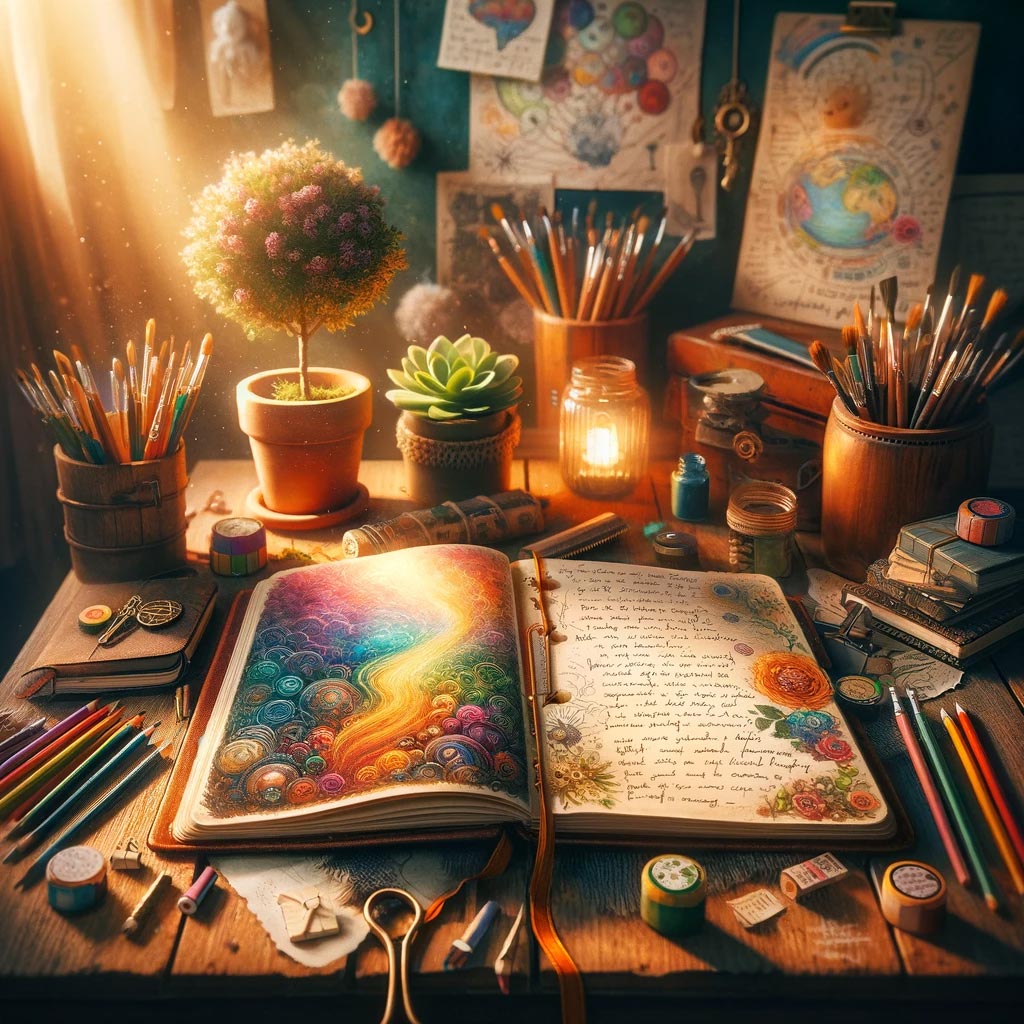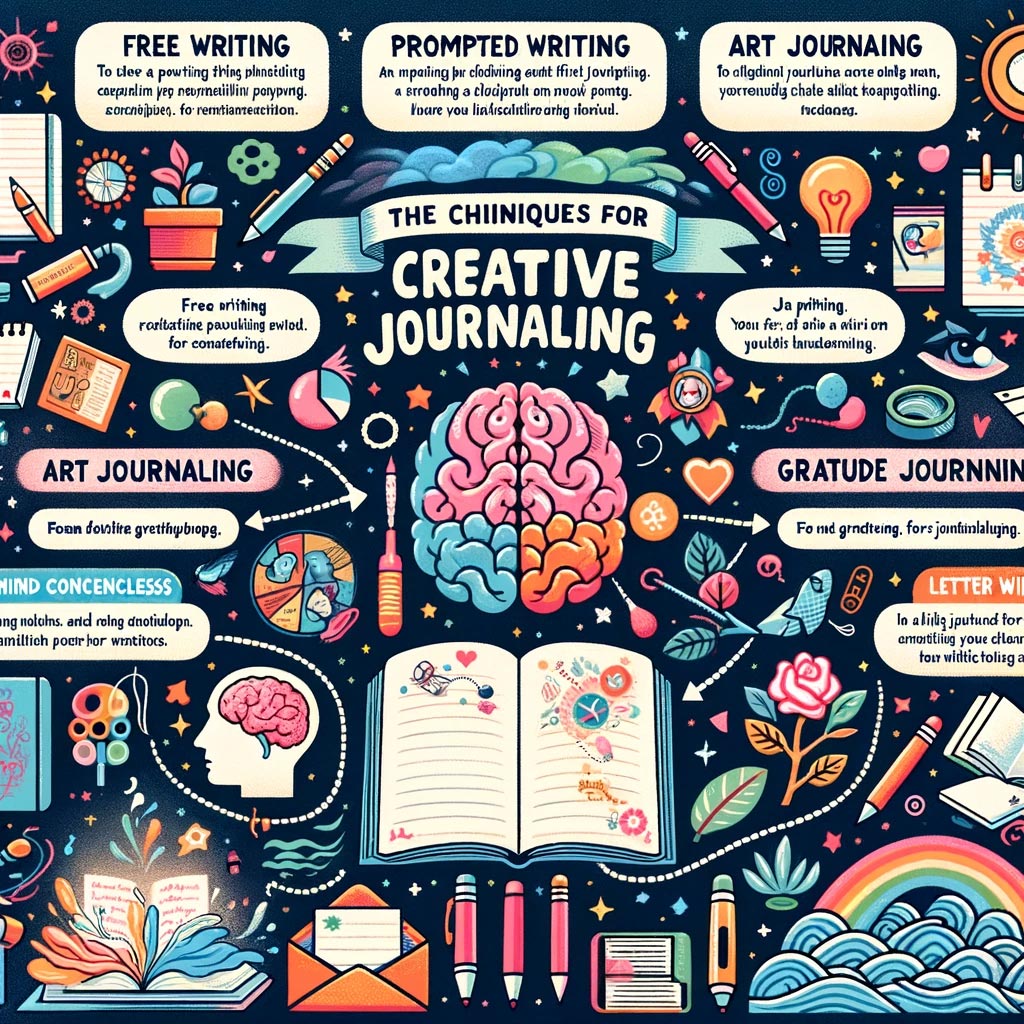
Boost Creativity with Journaling – Quick Inspiring Tips
In the quest for unlocking our full creative potential, the simple practice of journaling emerges as a powerful tool. This article delves into the myriad ways journaling can inspire creativity, supported by scientific evidence, expert insights, and practical techniques. Whether you're a writer, artist, or any individual striving for personal development, discover how this accessible habit can transform your creative journey.
Introduction to Journaling and Creativity
Journaling stands as a powerful and accessible tool for fostering creativity, self-awareness, and emotional resilience. This simple practice of writing down thoughts, feelings, and experiences not only serves as a conduit for expressing oneself but also acts as a mirror reflecting one’s inner world. It encourages mindfulness, helps to organize thoughts, and provides clarity, thereby unlocking creative potential. By engaging in regular journaling, individuals can explore their subconscious, identify patterns in their thoughts and behaviors, and cultivate a deeper understanding of themselves. This process of introspection and reflection can spark creative ideas, enhance problem-solving skills, and promote mental well-being. Whether for personal growth, artistic expression, or therapeutic purposes, journaling offers a unique blend of benefits, making it an indispensable habit for anyone looking to enrich their creative journey.
The Science Behind Journaling and Creativity
Research has consistently shown a positive link between the practice of journaling and increased creativity. For instance, studies indicate that regular diary writing enhances one's ability to think divergently, a key component of creativity. This process of reflective writing encourages mindfulness, self-reflection, and the exploration of one's thoughts and feelings, which can lead to novel ideas and creative breakthroughs.
Expert Views on the Power of Journaling
Creativity experts and psychologists tout journaling as a vital exercise for creative professionals. Julia Cameron, author of "The Artist's Way," advocates for morning pages—a form of daily journaling—to clear the mind and spark creativity. Similarly, psychologist James Pennebaker's work on expressive writing highlights its therapeutic effects, which can indirectly foster a creative mindset by reducing mental clutter.
Practical Tips for Incorporating Journaling into Your Routine
Making journaling a part of your daily life can seem daunting, but with these practical tips, you can seamlessly integrate it into your routine:
- Set aside a dedicated time: Choose a time of day when you can write without interruptions, be it morning, afternoon, or evening.
- Keep it accessible: Have a journal and pen handy at all times or use a digital app if you prefer typing.
- Write freely: Don't worry about grammar or coherence. The goal is to let your thoughts flow unfiltered.
Techniques for Creative Journaling
Creative journaling is a versatile and enriching practice that can enhance your writing skills, boost your creativity, and provide a unique outlet for self-expression. By exploring various techniques, you can discover new ways to unlock your creative potential and make your journaling practice more engaging and fruitful. Here are some impactful techniques for creative journaling:

1. Free Writing
Free writing involves writing non-stop for a set period, usually between 5 to 20 minutes. The key is to let your thoughts flow without worrying about grammar, spelling, or making sense. This technique helps bypass your inner critic, allowing subconscious thoughts and creative ideas to surface.
2. Prompted Writing
Using prompts is a great way to kickstart your creativity on days when you're feeling stuck. Prompts can be anything—a word, a question, a quote, or an image—that inspires you to write. They can guide your thoughts in new and unexpected directions, leading to surprising discoveries about your feelings, ideas, and memories.
3. Mind Mapping
Mind mapping is a visual technique where you write a central idea in the middle of a page and draw branches to other related ideas, words, or images. This method is particularly useful for brainstorming, organizing thoughts, and connecting different concepts, making it easier to generate new ideas for projects, stories, or personal reflections.
4. Art Journaling
Combining words with visuals, art journaling allows you to express your creativity both through writing and drawing, painting, collaging, or any other art form. This technique can help you convey emotions and ideas that might be difficult to express with words alone, offering a more holistic view of your thoughts and feelings.
5. Dream Journaling
Keeping a dream journal involves writing down your dreams as soon as you wake up, capturing the vivid imagery and bizarre narratives that your subconscious mind creates. Analyzing your dreams can spark creative ideas, help you understand your innermost desires, and provide insight into your emotional and psychological states.
6. Gratitude Journaling
Focusing on the positive aspects of your life, gratitude journaling involves writing down things you're thankful for each day. This practice can shift your perspective, open your eyes to the beauty and abundance around you, and inspire a deeper appreciation for the simple joys in life, fueling your creativity with positive energy.
7. Letter Writing
Writing letters in your journal, whether to yourself, a loved one, a fictional character, or even an inanimate object, can unlock deep emotions and perspectives. This form of journaling allows you to explore different voices, narratives, and viewpoints, enhancing your empathy and creative writing skills.
8. Stream of Consciousness
This technique involves writing down your thoughts as they come, without any filter or structure. It's similar to free writing but focuses more on the continuous flow of your consciousness, helping you explore the depths of your mind and the intricacies of your thoughts.
9. Themed Journals
Creating a journal around a specific theme—such as travel, poetry, nature, or personal growth—can provide focus and direction for your writing. This approach allows you to dive deep into subjects that interest you, fostering expertise and a richer understanding that can fuel your creativity.
Famous Creatives Who Journal
History is replete with examples of renowned creatives who relied on journaling. Leonardo da Vinci's notebooks were not only sketches but also contained his musings on life, art, and science. Similarly, writers like Virginia Woolf and Ernest Hemingway kept journals, which served as a reservoir for their thoughts and a workshop for their ideas.
Understanding the Psychological Mechanisms
Journaling acts on various psychological levels to boost creativity:
- Enhances Self-Awareness: By reflecting on your thoughts and emotions, you gain insights into your own creative process.
- Reduces Anxiety: Writing about your fears and challenges can lessen their impact, clearing the way for creative thinking.
- Boosts Memory and Comprehension: The act of writing helps in consolidating memories and ideas, making it easier to connect disparate thoughts creatively.
Conclusion and Call to Action
The practice of journaling stands out as a remarkably simple yet profoundly effective method for inspiring creativity. It's not just about recording daily events but engaging in a reflective process that stimulates creative thinking and personal growth. Whether through free writing, mind mapping, or prompted journaling, this practice can unlock the door to a richer, more creative life.
As we've explored, the benefits of journaling for creativity are backed by scientific evidence, endorsed by experts, and exemplified by some of the greatest creative minds in history. Now, it's your turn to take up the pen (or keyboard) and start your journaling journey. Remember, the goal is not perfection but progress. Let your journal be a space where your creativity can roam freely, without judgment or restraint.
Start Journaling Today
- Embrace the habit of daily journaling.
- Experiment with different techniques to find what best sparks your creativity.
- Reflect on your progress and adapt your practice as you grow.
Journaling is more than a practice; it's a journey toward understanding oneself and unlocking the vast creative potential within. Begin today, and let journaling guide you to new heights of creativity and self-discovery.
Study Tips




